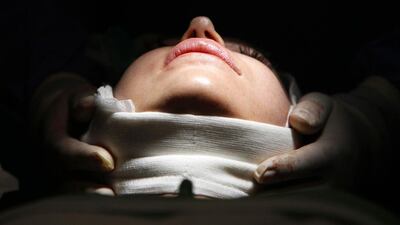An increasing number of botched plastic surgery procedures are coming to light, most of them performed by fraudsters in homes or in hotel rooms. As The National reported yesterday, doctors say that the most popular enhancements are injections for fuller lips and buttocks. The result is that many patients unknowingly find themselves injected by unlicensed practitioners with unknown substances that could lead to infections, rejection of the filler or scarring.
All of this is very worrying but the key word is “unknowingly”. Patients should not be unknowingly subjecting themselves to medical procedures, executed in non-surgical facilities such as a hotel room or kitchen. People have to understand the risks involved in seeking cosmetic surgery from practitioners about whom they know nothing.
At the very least, one might expect a potential patient to do due diligence before the procedure to ascertain their surgeon’s record and reputation. Patient reviews might seem too much like buying a consumer product such as a toaster or a TV, but every piece of information about the doctor and the procedure will contribute to the patient’s peace of mind. As Dr Sanjay Parashar, who is in the cosmetic surgery sector said, people who want a nip or a tuck should go to the licensed practitioners registered at the Emirates Plastic Surgery Society or the American Society of Plastic Surgeons. He also warned against the lure of suspiciously cheap offers.
The health authorities must also do more to address the problem. The situation has improved just a bit from the nadir it reached a few years ago, but there are still too many horror stories and too many rogue practitioners wandering around, scalpel at the ready. Clearly, there is a need for tighter regulation of the sector and a strong licensing system. An example must be made of any “cowboy” plastic surgeons who are caught. As the country develops its medical tourism industry, it’s bad for the health of that ambition – and that of unwary patients – to allow rogues to operate.

